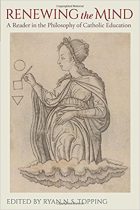Topping, R. N. S. (2015). Renewing the mind: A reader in the philosophy of Catholic education. Washington DC: Catholic University Press.
 This is a compendium of writings on education ranging from the classical (including Plato, Aristotle, Augustine and Aquinas) to the recent, primarily (although not exclusively) from a Catholic perspective. The nearly 40 entries can be read as a continuum or as selections. Topping provides a brief introduction, further reading and study questions for each selection, which make this very useful as a teaching text. Because the entries are so numerous and varied I focus this annotation on Topping’s overall introduction, which is brief, provocative, and beautifully written.
This is a compendium of writings on education ranging from the classical (including Plato, Aristotle, Augustine and Aquinas) to the recent, primarily (although not exclusively) from a Catholic perspective. The nearly 40 entries can be read as a continuum or as selections. Topping provides a brief introduction, further reading and study questions for each selection, which make this very useful as a teaching text. Because the entries are so numerous and varied I focus this annotation on Topping’s overall introduction, which is brief, provocative, and beautifully written.
Topping states the purpose of the book is “to introduce students and teachers to a noble tradition of debate over the first principles of education” (p.1). He contrasts liberal education (“liberating” because it lifts a person from ignorance) with the kind of “servile” education – training in technique; preparation for a career – that is emphasized in modern education. He notes the ideal goal of education goes beyond knowledge and “temporal welfare” to promote eternal good or “happiness with God”, infinite love (p.3). Topping expresses a recurring theme in writings on Catholic education as “the narrowing of our ambitions for our students [leading to] the abandoning of liberal study for the sake of mere economy” (p.4). This is connected with devaluing the role of reason and the separation of reason and faith.
Topping describes two “educational heresies” that have eroded the early vision of education.
The first is the late medieval retreat from the “metaphysical realism” (Thomism, after St. Thomas Aquinas) that combines sense experience of the particular and reason that discerns the essence that unites them in “classes” and the rise of “nominalism” (e.g. William of Ockham) that “objects are discrete entities” with no causal links (p.6). The latter separates faith and reason and God becomes unreachable and unknowable: “reason has no rope to heaven” (p.6). A memorable line here: “faith flounders without reason for the same reason that legs fall flat without feet” (p.7). By the time of Kant (1724-1804) reason is reduced to empirical observation (facts) and “anything outside the senses is relegated to values, that is, to opinions” (p.7). Reducing faith to opinion or “values” leaves no way to “defend the rationality of faith or, ultimately, the unity of the curriculum. Another memorable line: “take God away from the universe and you lose the university” (p.7).
The second “educational heresy” is a consequence of the foregoing “lost hope in heaven … “the dream of a perfect society” (p.7). Topping explains that secular (which simply means an “age”) is not bad, and that Catholics have always believed the world is essentially good, but “worldly modern philosophers” such as Rousseau attributed evil to society, and the road to individual freedom as education in knowing one’s own mind, a kind of “enlightened self-interest” that “values self-esteem over virtue and self-expression over obedience” (p.8). [In Lonergan and Crowe terms, cultivating the way of experience and not the way of heritage)
Topping’s own view of education follows Newman’s ideal of “formation”. He stresses that education is not “a thing” but “a process”. A problem is that “teachers have been taught to say that they wish children to explore their own values. This is cowardly. Teaching is violent. Every act of instruction is an incursion upon a living organism that you hope to change through the encounter” (p. 9). Freshmen are “half-formed” and we need to form them wisely. He also notes the problem that many teachers (and we could include faculty) are not well informed about the origins (history and goals) of their own disciplines.
The selected readings are divided into four sections: The aims of education, the matter of learning (its form and content or curriculum) methods of teaching (pedagogy) and “renewal in our time” which focuses on contemporary challenges and responses in Catholic education.
Questions:
- Can we compare/contrast Topping’s view of Rosseau’s “knowing one’s own mind” as inimical to education with Lonergan’s emphasis on knowing how one thinks as essential to education? What are the essential differences and why is this important?
- Is it accurate to say that reason is generally de-valued in today’s education, or only in relation to faith?
- We constantly stress the need for students to develop “critical thinking”, but especially in light of the above, what do we really mean by that?